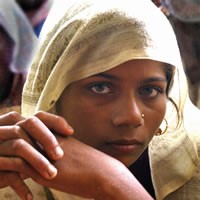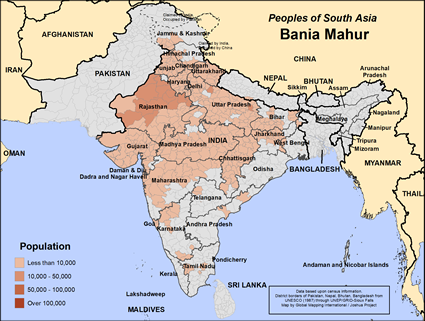Bania Mahur in India

Photo Source:
Copyrighted © 2026
Isudas All rights reserved. Used with permission |

Map Source:
People Group data: Omid. Map geography: UNESCO / GMI. Map Design: Joshua Project.
|
| People Name: | Bania Mahur |
| Country: | India |
| 10/40 Window: | Yes |
| Population: | 877,000 |
| World Population: | 877,000 |
| Primary Language: | Hindi |
| Primary Religion: | Hinduism |
| Christian Adherents: | 0.00 % |
| Evangelicals: | 0.00 % |
| Scripture: | Complete Bible |
| Ministry Resources: | Yes |
| Jesus Film: | Yes |
| Audio Recordings: | Yes |
| People Cluster: | South Asia Forward Caste - Bania |
| Affinity Bloc: | South Asian Peoples |
| Progress Level: |
|
Introduction / History
The Banias originated over 5,000 years ago, and they are also called Vania or Mahajan. Their name is derived from 'Vaniji ', which means "trader or mercahnt" in Sanskrit.
Of the four major varnas or castes, Banias are in the third one, the Vaishyas. This caste cluster has always been about trade, business, and money lending. They were usually traders of grain and spices throughout history. Today Bania is a rather loose term, sometimes meaning caste and other times just business people.
Despite their high incomes, the Banias have only modest status in the Hindu caste pyramid. They often resent the higher two varnas, the Brahmans and the Kshatryas. Banias have often been leaders in caste reform movements. Many Banias are moving to Banglalore, India's "Silicon Valley" to take advantage of the business opportunities there.
Where Are they Located?
Most Bania Mahur live in the Indian states of Rajastan and Uttar Pradesh. Smaller numbers live in Madhya Pradesh, Gujarat, Maharashtra and other regions across India.
What Are Their Lives Like?
A Bania might be the proud owner of a giant business, a small one, or he might be working in a bank. He might even own the bank. Others work in government ministries or as lawyers, judges, teachers, scholars, stockbrokers, or engineers.
The Bania Mahur are among the wealthiest people in India. Business skills are passed down from father to son, and from an early age children are drilled in math and detailed calculations with the end purpose of winning in money transactions.
The Bania are exogamous, that is they will frequently marry outside their group. Sons inherit their father's property with the eldest son receiving the family home.
Most Banias are vegetarians while some eat meat except for beef.
What Are Their Beliefs?
Nearly all Bania peoples claim the Hindu religion, but as merchants they have chosen gods that reflect their profession. They often worship the goddess of wealth, Lakshmi and the god of good fortune, Ganesha. These are the gods who drive their lives.
The Bania Mahur participate in the yearly Hindu holidays of Holi, the festival of colors, Diwali, the festival of lights and Navratri, the nine-day celebration of autumn.
What Are Their Needs?
Mahur Banias need a spiritual transformation that will bring them to the point where they want to follow the ways of Jesus, and abandon the old ways. These ways have left them spiritually empty. Most of all the Bania Mahur need to hear the life-changing gospel of Jesus Christ in a way they can understand. They need to see the love and mercy of Christ lived out before them.
Prayer Points
Pray that the veil of deception will be lifted from the eyes of Bania Mahur, and that they will see that the only true wealth is the spiritual riches gained through a loving relationship with Jesus Christ.
Pray that Christian workers will be called to work among them and share Christ in a culturally relevant way.
Pray for a disciple making movement to emerge among every Bania Mahur community.